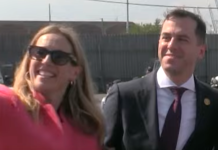The Jersey City Council took Suez Water representatives to task over E. coli contamination communications, or lack thereof, when a boil water advisory was issued last month.
 By John Heinis/Hudson County View
By John Heinis/Hudson County View
Jason O’Brien, the Suez Vice President and general manager who oversees their Northeast region for environmental services division, and Angelita Fasnacht, the Suez Vice President of Technical Services, testified in front of the council at today’s caucus meeting held via Microsoft Teams.
Last month, several Jersey City residents expressed outrage over the fact that Suez appeared to wait three days from their first positive E. coli test at Christ Hospital, which occurred on August 11th, before issuing a boil water advisory on August 14th.
According to a brief presentation given by O’Brien, Suez tests 2,300 samples per year in Jersey City, which includes 1,800 total coliform bacteria samples – which could indicate the presence of E. coli.
Thus far in 2020, there have been six total coliform samples present, or 0.3 percent, with just one confirmed during resamples, O’Brien said.
On August 11th around noon, Suez conducted 16 daily bacteriological samples and one sample at Christ Hospital had total coliform and E. Coli bacteria.
Two days later, on August 13th, a resample found only present in downstream, which was confirmed by 8 p.m. As a result, the New Jersey Department of Environmental Protection and the Jersey City Municipal Utilities Authority was notified by 8:15 p.m.
Ward D Councilman Yousef Saleh was one of many electeds who wanted to know what the protocols in place are for contacting city officials in a scenario such as this one.
“I am aware that it’s part of the communication protocol, I just can’t remember what step it is in the policies and procedures, but we have a whole communication policies and procedures developed to make sure those steps are followed and I see in that procedure is a notification for everybody,” O’Brien responded.
“It’s not just the initial result, if after there’s been a confirmation that an actual boil water advisory needs to happen.”
It what seemed to be the start of a trend, Saleh wasn’t satisfied with that response.
“I was notified on Friday and then I had a lot of angry residents thinking that we were trying to hide the ball from them but that’s not the case at all: we notified them as soon as we found out and I drink a lot of water …. so I think that notifying the city officials should be the first step.”
Ward B Councilwoman Mira Prinz-Arey revealed that she found out about the boil water advisory through a reverse 911 message, what she felt was another example of people being left in the dark.
” … You create a lot of confusion. We have a lot of residents that are already anxious because of everything that seems to be happening in and around this pandemic. It created a lot of concern. There was no real, clear communication,” she said.
Councilman-at-Large Rolando Lavarro also pressed about why notifications did not explicitly say that E. coli had been detected.
“The notifications did not indicate that is was E. coli, both to the public and others: I found out from a news report that is was actual E. coli … I found out from a Twitter feed from residents that had found public documents that I guess that you had posted, Suez had posted on it’s website,” he began.
Still, O’Brien held has ground that Suez followed the rules.
“The communication procedures by Suez followed the state and federal guidelines. But what happened was the JCMUA wanted to take a proactive approach, out of an abundance of caution with the pandemic going on, and just do the reverse 911 that morning on the Friday.”
He continued that an official notice went out later that day following consultation with the NJDEP.
Nevertheless, the council continued to press on, with Ward E Councilman James Solomon pointing out that this isn’t the first time the city has been frustrated by Suez.
“We had one [a boil water advisory] in April, in the height of the pandemic, and I sent follow ups to your team here in Jersey City after that point, saying that the council had not been communicated with, that we weren’t able to communicate effectively with our constituents in the midst of a pandemic,” he expressed.
“And then it to happened again three months later, for a lot of us, it was extraordinarily frustrating.”
O’Brien addressed concerns about not immediately indicating that E. coli was found in a test sample, noting that it would have been “irresponsible” to do without confirming with a second test – also indicating it would have slowed down the notification process significantly.
” … The E. coli I was not at liberty to share that yet … it needed to be approved by the DEP in the formal advisory. I know full well here that I was taking a bit of a risk here doing that. I did save quite a bit of time between when the formal notice went out, which still went out well within the stipulated time the EPA requires, but we did cut if off by approximately 10 or 11 hours.”








